Carlito's Way Blu-ray Movie
HomeCarlito's Way Blu-ray Movie 
Universal Studios | 1993 | 144 min | Rated R | May 18, 2010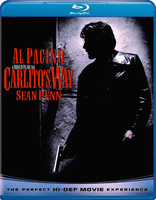
Price
List price:Amazon: $10.33 (Save 11%)
Third party: $8.95 (Save 23%)
Available to ship in 1-2 days
Movie rating
8.1 | / 10 |
Blu-ray rating
| Users | 4.6 | |
| Reviewer | 4.0 | |
| Overall | 4.3 |
Overview
Carlito's Way (1993)
A Puerto Rican ex-con, just released from prison, pledges to stay away from drugs and violence—despite the pressure around him—and lead a better life outside New York City.
Starring: Al Pacino, Sean Penn, Penelope Ann Miller, John Leguizamo, Ingrid RogersDirector: Brian De Palma
| Crime | 100% |
| Drama | 87% |
| Period | 36% |
Specifications
Video
Video codec: VC-1
Video resolution: 1080p
Aspect ratio: 2.35:1
Original aspect ratio: 2.39:1
Audio
English: DTS-HD Master Audio 5.1 (48kHz, 24-bit)
French: DTS 5.1
Subtitles
English SDH, French, Spanish
Discs
50GB Blu-ray Disc
Single disc (1 BD)
BD-Live
D-Box
Playback
Region free
Review
Rating summary
| Movie | 4.0 | |
| Video | 4.5 | |
| Audio | 4.5 | |
| Extras | 2.5 | |
| Overall | 4.0 |
Carlito's Way Blu-ray Movie Review
'Scarface' redux? Not really, though the same director and star revisit mobster territory in this visceral crime thriller.
Reviewed by Jeffrey Kauffman May 22, 2010There’s a fine line between crafting an hommage and outright ripping someone off. Probably no director has suffered the slings and arrows of both categories than Alfred Hitchcock. Hitchcock was so distinctive in both technique and subject matter that whole generations of directors have come along to mimic his style and narrative proclivities. Sometimes they’ve just outright aped him, as in Gus Van Sant’s intellectually interesting but artistically hollow remake of Psycho, a film that literally copied (more or less, with a couple of notable exceptions) every shot, angle and supposed nuance of Hitchcock’s 1960 masterpiece. All that was missing was the terror and subtext which Hitchcock alone seemed to be able to effortlessly bring to not just this particular film, but all of his great achievements. Sometimes the copying has been a little more subtle, as in the case of Brian De Palma, who visited the often twisted psychological landscape of Hitchcock in several films (notably Obsession, Body Double and, perhaps, Dressed to Kill), while at least touching tangentially on several major themes of the Master of Suspense in other films like Carrie and Sisters. De Palma has in fact made no secret of his love of not just Hitchcock, but a whole gallery of iconic filmmakers, often quoting their set pieces outright or indicating his sources without much obfuscation. You might get Eisenstein in The Untouchables or Antonioni in Blow Out. And so one is left to wonder if a director can actually rip himself off when he’s spent so much of his career unabashedly imitating other directors’ set pieces and overall styles. Carlito’s Way is in many ways a retread of De Palma’s previous effort with Pacino, Scarface (itself a remake of sorts, of course), covering the same gangster ethos as that other film, but with a perhaps grittier psychological subtext made especially visceral as a result of the flashback technique of the narrative.
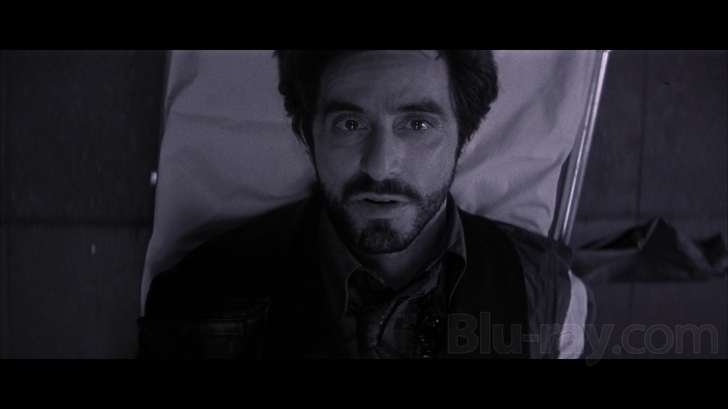
Nothing is black and white in 'Carlito's Way.' Except for this scene.
Carlito’s Way was made in 1993, a sort of crossroads for De Palma. After a number of notable successes, he had hit a rough patch with flops like Bonfires of the Vanities and Raising Cain. Ten years after his version of Scarface De Palma returned to Pacino playing a mobster, albeit one desperately trying to go straight and extricate himself from his life of crime. Carlito’s Way was based on two exciting novels by an actual Judge, Edwin Torres, the eponymous novel and its followup After Hours, which actually provided the bulk of the plot for David Koepp’s screenplay. The filmmakers opted for the Carlito’s Way title to avoid confusion with Martin Scorsese’s scabrous black comedy from 1985 starring Griffin Dunne as a hapless word processor caught in a Kafkaesque series of mishaps.
This is a film filled to the brim with virtuoso performances. While some may accuse Pacino (perhaps rightfully so) of rehashing Tony Montana in a sort of “kinder, gentler” mode, the actor brings a depth of feeling and growing remorse to his Carlito Brigante that really sets this character totally apart from Montana’s take no prisoners approach. Penelope Ann Miller is a lovely presence as love interest Gail, a woman seeking to help show Carlito a way out of his former life. John Leguizamo, Luis Guzman and Viggo Mortensen are also on hand in supporting roles as cohorts (and in one case a betrayer) of Carlito, each of them bringing a lot of snap and presence to their performances. But the film quite simply belongs to Sean Penn in an incredible, nearly unrecognizable turn as Carlito’s attorney and supposed best friend David Kleinfeld. Penn, with the front of his head shaved to mimic a receding hairline, and the rest of his hair dyed red and permed to be curly, inhabits the sleazy, duplicitous role completely, making Kleinfeld the ambiguous center of a story filled with moral decrepitude and despondency. It is one of the greatest performances of an actor who has repeatedly defied expectations with a series of radically different roles.
The film plays out as a dialectic between Carlito’s dreams of escape (symbolized by a neon sign showing people relaxing on a Caribbean beach) and the relentless forces of his former lifestyle which repeatedly suck him back into the world of gangsters and crime. As inexorable as gravity, those forces pull Carlito down into a vicious series of events culminating in several violent deaths, ultimately leading to Carlito’s realization that several people in his own inner circle have been both figuratively and literally gunning for him. Since the film is told in flashback, there’s really no mystery to how this tragic story is going to unfold, but De Palma’s sure footed staging of several virtuoso set pieces keeps the audience guessing in terms of several subplots and character motivations.
De Palma was soon to prove his mettle once again with meticulously staged action sequences in Mission: Impossible, but the fact is the director has always had a more or less inerrant eye for set pieces from his earliest successes from the 1970’s. Carlito’s Way shows De Palma stretching his directorial muscles with several excitingly long takes, often with complex tracking or crane shots, none of which are overtly showy enough to draw the viewer out of the story, but which, upon reflection, show De Palma trying to craft a visceral style for himself that perhaps finally breaks free of any previous directorial influences.
Carlito’s Way didn’t quite achieve critical mass on its initial release, and only in the subsequent almost two decades since its premiere has achieved a sort of cult status, newly appreciated as one of De Palma’s most interesting character studies. De Palma has always had a superb touch with actors, and aside from the expert framing he employs throughout this film, the performances may indeed be the lasting legacy of Carlito’s Way. This is a film full of shifting allegiances and motivations, and De Palma and Koepp keep the myriad character impulses clear and precise. Luckily they’re supported by a stellar assortment of actors, most at the top of their game. Pacino had in fact just come off his Oscar win for Scent of a Woman and he seems to relish the chance to play a character this conflicted, at times incredibly naïve and at others unbelievably street smart. Ultimately, though, it’s Penn’s work that is going to stick most forcefully with a lot of viewers. You may in fact not believe you’re actually seeing the actor when you first lay eyes on David Kleinfeld, so startling is the transformation, both physically and psychologically. It’s one of the most commanding tours-de-force in relatively recent film, and if you’re drawn to Carlito’s Way for no other reason than to experience this incredible performance, you most likely won’t come away disappointed.
Carlito's Way Blu-ray Movie, Video Quality 
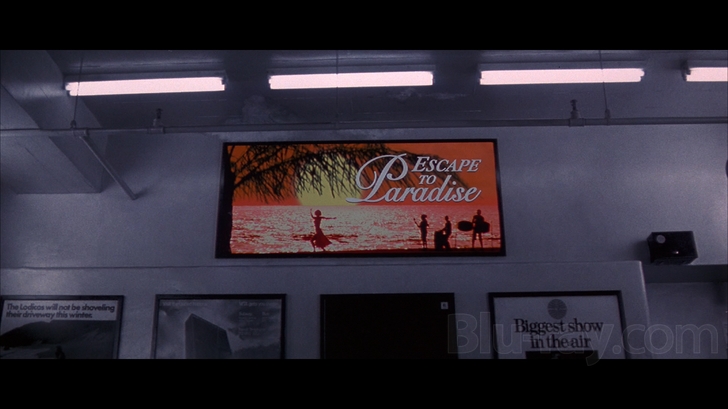
Carlito's Way blasts its way onto Blu-ray in a blood red VC-1 encoded transfer in full 1080p and a 2.35:1 aspect ratio. Universal hasn't exactly been treating its catalog titles with a lot of care lately (Out of Africa and Spartacus are two recent, largely lamentable examples). The bad news is Universal doesn't seem to have done much with Carlito, following in the footsteps of those other, perhaps more illustrious, releases. The good news is that means no hideous edge enhancement and no apparent DNR. The bad news is the print does not seem to have been cleaned or restored, so there is occasional very slight damage and debris. The good news (is this ping pong or something?) is the film looks excellently sharp overall and well detailed, and colors are excitingly vibrant, especially on the red end of the spectrum. Black levels and contrast are very strong, and shadow detail is really exceptional. De Palma uses some interesting multi-hued palettes throughout the movie, which play out like a sort of nightmarish episode of pastel-laden Miami Vice, and the Blu-ray reproduces this wide variety of shades brilliantly. The film actually starts in a post-processed black and white sequence, and contrast is exceptional in those moments.
Carlito's Way Blu-ray Movie, Audio Quality 
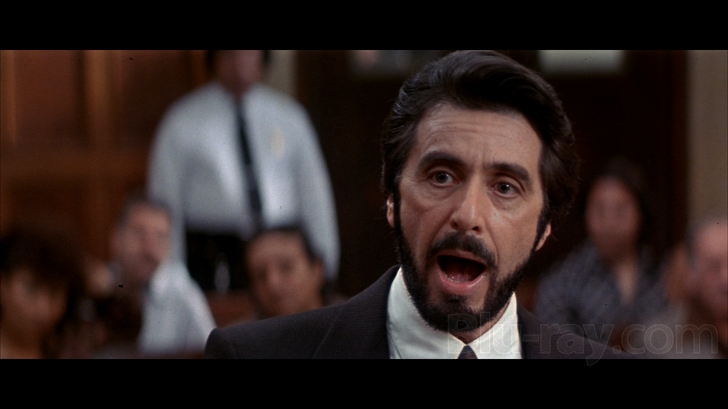
Carlito's Way's lossless DTS-HD Master Audio 5.1 mix may not be as bombastic as some audiophiles might be expecting, especially considering the subject matter, but it's really a good track in and of itself, with a full and well rendered soundfield and some of the more consistently active rear channel effects I've heard recently. One of the greatest pleasures of this track is the absolutely gorgeous underscore by Patrick Doyle, with elegiac string writing which is very redolent of Barber's "Adagio for Strings" and Vaughan Williams' "Fantasia on a Theme by Thomas Tallis." While some of the foley effects like gunshots sound compressed and overly narrow, balance between dialogue, score and effects is very well modulated, with dialogue always easy to hear and directionally well placed.
Carlito's Way Blu-ray Movie, Special Features and Extras 
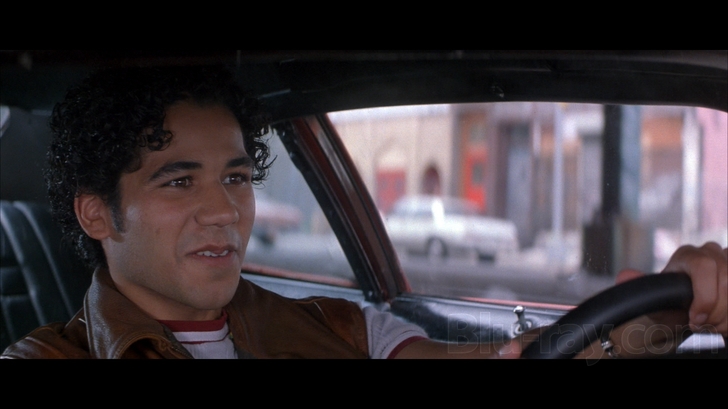
Some, but not all, of the extras on the SD-DVD release of Carlito's Way have been ported over to this release:
- The Making of 'Carlito's Way' (SD; 34:36) is one of the standard making of featurettes we've come to expect from regular in this idiom Laurent Bouzerau.
- Brian De Palma on 'Carlito's Way' (SD; 5:26), though short, offers the director talking about casting and filming.
- Deleted Scenes (SD; 8:15), offers extended or excised versions of nine fairly forgettable scenes.
Carlito's Way Blu-ray Movie, Overall Score and Recommendation 
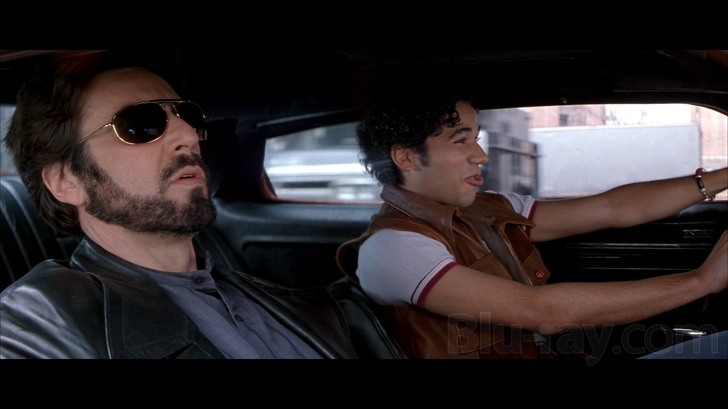
Brian De Palma manages to helm a film that delivers a lot of cinematic sweep while also offering uniformly excellent performances by Pacino, Miller, a great supporting cast, and most especially Penn in one of his most unusual interpretations. It's dour and unrelenting, but Carlito's Way is never less than fully involving and comes recommended.
Other editions
Carlito's Way: Other Editions

Carlito's Way
1993

Carlito's Way
1993

Carlito's Way 4K
1993

Carlito's Way 4K
1993

Carlito's Way 4K
Limited Edition
1993

Carlito's Way 4K
Original Artwork | Limited Edition
1993

Carlito's Way
Remastered Edition
1993
Similar titles
Similar titles you might also like

King of New York
1990

Live by Night
2016

The Godfather 4K
1972

The Godfather: Part II 4K
1974

Mean Streets 4K
1973

The Wolf of Wall Street 4K
2013

GoodFellas 4K
1990

The Shawshank Redemption 4K
1994

Casino 4K
1995

Donnie Brasco
Extended Cut
1997

Billy Bathgate
1991

The Godfather: Part III
1990

Boardwalk Empire: The Complete First Season
2010

Menace II Society
Director's Cut
1993

Road to Perdition
2002

The Yards
2000

The Irishman
2019

Get the Gringo
2012

Once Upon a Time in America
Extended Director's Cut
1984

What Doesn't Kill You
2008